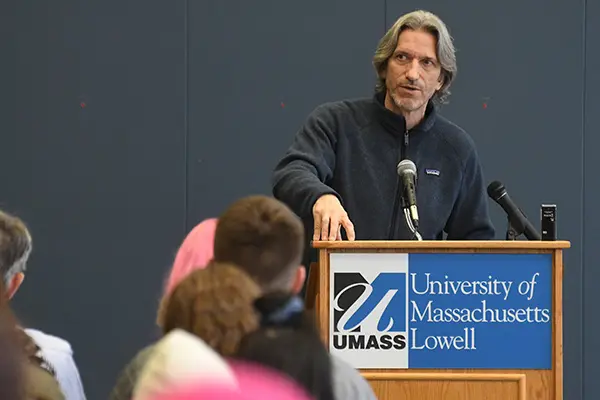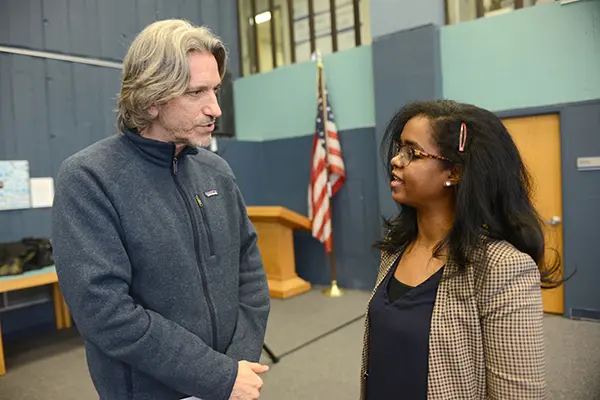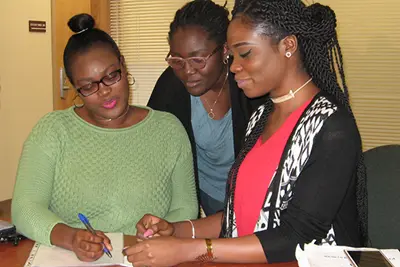Former Greeley Peace Scholar John Prendergast Says Student Activism Matters
 Image by Tory Germann
Image by Tory Germann
02/17/2017
By Katharine Webster
Student activism matters.
That’s the hopeful message former Greeley Peace Scholar John Prendergast delivered on a return visit to campus last week, citing examples from the civil rights to the LGBTQ rights movements.
“In nearly every social movement, students play the leading — the crucial — role,” he told a crowd of students and faculty in O’Leary Library.
That’s because politicians are willing to listen to students — in part because they see students as future voters, in part because they often feel an emotional connection to their own youthful idealism and activism, he said.
Students also can bring pressure to bear on seemingly distant problems if they’re active and organized, he said. One example: Joseph Kony, who abducted tens of thousands of children, the boys to serve as soldiers in his Lord’s Resistance Army and the girls as sex slaves. Kony’s militia terrorized northern Uganda, displacing some 2 million people, starting in 1986. Yet his atrocities were virtually ignored outside Africa until the nonprofit Invisible Children released a short documentary about him in 2012.
Within days, the documentary went viral among young people, who formed Kony 2012 clubs on campuses from middle schools to universities to advocate for his capture. Suddenly, stopping Kony became a priority for Congress and President Obama. Although Kony still has not been captured, his army has shrunk from a high of 30,000 mostly child soldiers to 200 to 300 people, and Uganda’s refugees have returned to their homes, Prendergast said.
“This happened because of this grassroots movement of young people,” he said. “When students are active and organized, they can actually make a difference halfway around the world.”
Prendergast, who got his start as a student activist in the mid-1980s pushing for U.S. corporate divestment from South Africa’s brutal apartheid regime, has continued to work for peace and social justice in Africa for more than three decades.
The founder of the Enough Project, a nonprofit focused on ending genocide in Africa, he has worked for the Clinton and Obama administrations, the National Security Council, UNICEF and Human Rights Watch, among other organizations.
Prendergast was the university’s Greeley Scholar for Peace Studies in 2012 and 2013, when he resided on campus and led programs for students, faculty, staff and the community. The Greeley Scholar committee, the Peace and Conflict Studies Institute and the College of Fine Arts, Humanities and Social Sciences sponsored his latest talk. He also visited classes in African politics and human rights taught by visiting Asst. Prof. Noel Twagiramungu.
Prendergast is a board member and strategic adviser for Not On Our Watch, the humanitarian organization founded by George Clooney, Matt Damon, Don Cheadle, Brad Pitt, David Pressman and Jerry Weintraub. And that’s the other half of the equation for successful activism, he told students: strategic partnerships with celebrities willing to use their outsized platforms to promote a cause.
His initial involvement was with Angelina Jolie, early in her tenure as ambassador for the U.N. High Commissioner for Refugees. Celebrities are particularly helpful in generating interest in Washington, he said, describing how doors swung open on Capitol Hill for Ryan Gosling after Prendergast took him to Uganda because of Gosling’s concerns about child soldiers.
 Image by Tory Germann
Image by Tory Germann
Prendergast’s current project is the Conflict-Free Campus Initiative, a student-driven movement that asks universities to buy and recommend electronics from companies, such as Apple, that make sure “conflict minerals” — tin, tungsten, tantalum and gold mined by warlords in the Congo — are not in their supply chain.
The bloody conflict in the Congo has killed more than 5.4 million people, and it’s fueled by illegal mining and cheap sales of those minerals, just as that conflict and earlier African wars were fueled by the sales of so-called “blood diamonds” until students across the U.S. and Europe demanded international monitoring systems to exclude them from the marketplace, he said.
“We enjoy the cheap goods and services that come to us through what is often violent and illicit exploitation of natural resources, whether we like it or not,” he said. “Because of this connection we have to human exploitation, we have a responsibility to speak out and demand products that are not destroying people and their lives or the environment.”
Hagir Mohamed, a Ph.D. candidate in biomedical engineering from White Nile, a state in Sudan that borders South Sudan, said she was grateful for the light Prendergast shed on conflicts in Africa, including his discussion of the partly failed international effort to end the genocide in Darfur and the ongoing conflict between Sudan and South Sudan.
“Injustice in Sudan is everywhere, and any voice outside supporting us makes a difference,” she said. “Public services in most towns outside the capital, Khartoum, are collapsing because of the conflict and international sanctions.”




